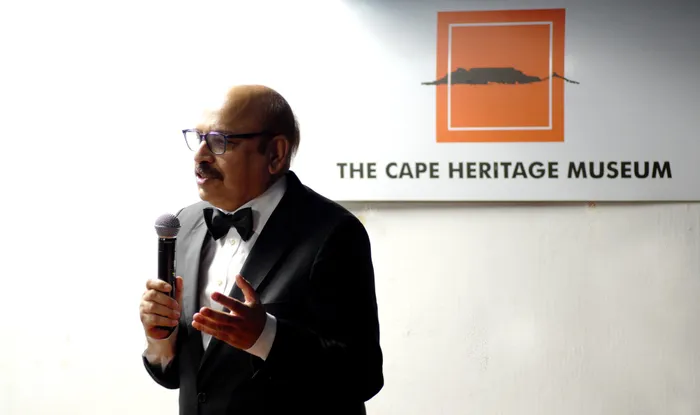Retired Judge Siraj Desai won’t back down after SAZF complaint finding

Retired Judge Siraj Desai delivers a keynote address at a gala event for the Cape Heritage Museum at the Cape Town Castle. Retired Judge Siraj Desai remains an ardent activist for human rights. Picture: Ian Landsberg / African News Agency (ANA)
Retired High Court Judge Siraj Desai says the actions he has taken in support of campaigns against Israel’s apartheid practices against Palestinians were not political, but were carried out in defence of human rights.
The human rights activist — who will soon celebrate half a century of service in the legal field — is unbowed in the face of a recent finding against him.
“I’ve spent my entire life opposing not only what is happening in Israel, but elsewhere in the world, where human rights abuses occur. It is an attempt to muzzle me from commenting on what for me today is the most significant human rights issue in the world,” Judge Desai said in an interview with IOL.
“They’re muzzling me on something judges have traditionally been vocal about. Judges have spoken out on human rights issues. There were some who spoke out against the apartheid government in South Africa. The majority, to their discredit, kept quiet,” he said.
“There is no ambiguity about the merciless oppression of Palestinians.”
In what has been welcomed by the South African Zionist Federation (SAZF) in its fight against Judge Desai, the Judicial Conduct Committee has “warned [Judge Desai] not to participate or become involved in any political controversy or any activity in the future, unless it is necessary to do so for the discharge of judicial duties”.
The 17-page finding came 22 months after Judge Nambitha Dambuza heard the matter, stemming from a complaint by SAZF about Judge Desai’s activism between 2009 and 2020 against Israel’s apartheid practices.
In 2020, Judge Desai was appointed Legal Services Ombud following his retirement.
In its complaint, SAZF accused Judge Desai of misconduct, in that he contravened the Code of Judicial Conduct by participating in several events in support of Gaza’s freedom, and his support of the Boycott, Disinvestment and Sanctions (BDS) campaign against Israel.
The support of campaigns aimed at ending apartheid practices carried out by Israel’s government were viewed by the SAZF to be in breach of Articles 12(1)(b), 12(1)(d), 14(2)(a) and 14(c)(3) of the Code of Judicial Conduct:
“Involvement in political controversy or activity, lending the prestige of the judicial office to advance private interests, and engaging in activities which are incompatible with the confidence or impartiality or independence of a judge.”
A number of instances of Judge Desai’s alleged misconduct were cited in the complaint: The Gaza March and BDS Campaign, a 2011 public dinner held in Cape Town, The Russell Tribunal on Palestine, interactions with Hamas, an online interview with an Iranian news channel, a meeting with the Palestinian ambassador to South Africa, signing of a BDS Coalition statement, among others.
But Judge Dambuza found little evidence to support the majority of the claims.
READ THE FULL JUDICIAL CONDUCT COMMITTEE FINDING
There were instances where Judge Dambuza found in favour of the complainant SAZF that Judge Desai had lent the prestige of his office in support of campaigns, and thus issued the remedial action that he be warned not to participate nor involve himself in political controversy.
However, despite this, Judge Desai still cuts a decisive and defiant figure.
“The only offensive part of this order was the warning issued at the end. It was out of kilter with the rest of the reasons furnished by [Dambuza],” Judge Desai said.
“The warning itself is offensive for several reasons, the most important being, it’s a warning not to criticise apartheid Israel. It is a warning which effectively curbs criticism of the Israeli state,” he said.
“Judge Dambuza places herself in this ruling, on the wrong side of history.”
Judge Desai said in Francisco Franco’s Spain between 1939 and 1975, judges spoke out against fascism.
“It’s the duty of every human rights attorney, activist or judge to speak out against any significant human rights abuses,” he said.
“This is an attempt to muzzle me, and I refuse to be muzzled.”
Judge Desai has appointed counsel to pursue an appeal against the finding.
IOL